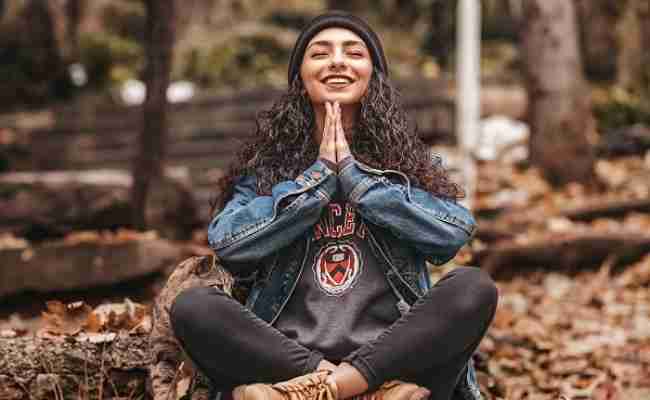
We all feel anxious at various points in our lives and the reasons for this anxiety are wide ranging. While most of us are aware that anxiety can have a negative impact on our wellbeing, given the kind of world we live in, it is impossible to completely avoid it.
In such circumstances, we need to learn to manage our anxiety so that it does not completely take over our minds and our emotions. We should bring ourselves to a position where we can identify the stresses we feel and take steps to counter the negativity.
What causes anxiety?

From an Ayurvedic perspective anxiety is a disturbance of the nervous system which is caused by an imbalance of the Vata dosha. An air principle, Vata is a type of kinetic energy that regulates movement inside the body. It is light, dry and mobile and, when balanced, has many positive effects on a person, enabling creativity, joy and intuition.
An imbalance of Vata causes an overabundance of movement that results in erratic thoughts, worries, obsession, confusion and sleeping difficulties. A person’s energy levels become disproportionate, with too much in the mind and not enough in the feet, causing a sense of being ungrounded.
People around the world are more prone to try out anxiety treatment at home than to seek more formal help. Over the centuries Ayurvedic principles have successfully calmed many anxious minds. Ayurvedic treatment for anxiety incorporates lifestyle changes, diet, ayurvedic medication, and massage.
Start by creating a daily routine

Following a structured routine each day can have a huge impact on mental wellbeing. Get up at the same time each day, have regular meals, demarcate your work hours, exercise regularly and at the same point in the day, and go to sleep at the same time each night. This kind of consistency, with predictable and familiar reference points, means there is no need to worry about how the day will pan out, thus providing comfort to the mind and body.
Practice Pranayama and mindful breathing
Pranayama, yogic breathing practices, are very beneficial in alleviating anxiety. Whatever the technique you may choose to use – belly breathing, alternate nostril breathing or boxed breathing – staying focused on the process of inhaling and exhaling will divert your thoughts away from whatever it is that is troubling you at the time. The conscious effort being put into regulating your breathing, along with the mindfulness of your breath patterns, is automatically very calming.
Meditate daily
Because anxiety involves an overactive mind and obsessive thoughts, meditation helps by freeing you of thoughts. In order to achieve this, you need to first acknowledge the power of these thoughts. In this way, you can let go and surrender to the moment. It is recommended that you meditate for 20 minutes or more each day. If you are just starting off, you can begin with 10 minutes and work your way up to longer durations.
Do yoga

Yoga helps to ease tension and stimulate circulation, thus providing much needed tranquility. A short 15-minute routine is sufficient to steady the mind. The kind of focus needed for yoga also facilitates better meditation and you could use it as a precursor to meditating.
Eat healthy
Eating a balanced, healthy diet is good practice for anyone. In Ayurveda, you need to choose the correct types of food to counter the effects of the dosha that is imbalanced. Because Vata is cool, light and dry, when faced with anxiety, you should eat warm, nourishing, heavy, substantive and grounding foods. In general, choose healthy, whole foods and avoid processed foods, refined sugars and stimulants. Steamed vegetables and home-made soups and stews are particularly effective. You should follow this diet until there is a notable drop in anxiety levels.
Try herbal remedies
Ayurvedic medicines use the natural healing powers of herbs. Each herb has its own super power and can help with different ailments, physical or mental. Ashwagandha (botanical name Withania somnifera) is one of the best Ayurvedic medicines for treating anxiety. It has an unusual dual function of both calming and energizing the body. Ashwagandha can be taken in either powder form or as a pill. Whichever form you consume, it is most effective when taken with food, preferably with your heaviest meal.
Give yourself a massage

Abhyanga is a Sanskrit word which means ‘self-massage’. It has been used over the years to calm the nervous system, lubricate and rejuvenate the tissues, and promote healthy circulation. You can try either our sleep intense calming body massage serum or Destress calming body massage serum to relieve tension and stress within your body. Given that anxiety is caused by too much Vata, use sesame oil to counter it. Gently massage the oil into your entire body, starting from the crown of your head and moving all the way down to your toes. Abhyanga is usually done before taking a shower so that you can wash away the oils. If time does not permit a full-body abhyanga, you could always rub a calming essential oil such as ylang ylang into the soles of your feet and, should you feel comfortable, into your scalp, before going to sleep.
Mild anxiety can be inconvenient, but in its most acute form it can be very disruptive. In order to be productive, and more importantly, to be at peace with ourselves, we should take control of our anxiety levels. When we are anxious we expend a lot of energy on negative thoughts and so we need to re-channel this energy in a more positive direction. Anxiety treatment at home is not too complex and, when followed up with ayurvedic anxiety medicine, can prove to be very successful. You just need to show yourself a little love and care. For a home pamper routine try our ritual sets to soothe, calm and restore your mind and senses.
- Marissa Jansz






